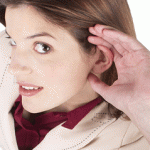 If any communication to be complete and effective, of course the words you use (whether oral or written) need to be chosen carefully. But remember, communication is two-way – we've got to learn to be a good listener too! Without learning to be a good listener, you're unlikely to achieve understanding. Think about it. It's not just speaking that conveys meaning – how the other person listens also conveys meaning to the other person, and this helps to make the exchange successful … or not! There's hardly any point in someone talking if no-one listens to what is being said. Listening is half of oral communication, and it is a skill that needs to be practised and taken equally as seriously as speaking and writing. Good listening skills will give you an edge in life and at work. However, if you are to become an effective listener, it's going to take more than just desire and enthusiasm. it's going to take a huge conscious effort.
If any communication to be complete and effective, of course the words you use (whether oral or written) need to be chosen carefully. But remember, communication is two-way – we've got to learn to be a good listener too! Without learning to be a good listener, you're unlikely to achieve understanding. Think about it. It's not just speaking that conveys meaning – how the other person listens also conveys meaning to the other person, and this helps to make the exchange successful … or not! There's hardly any point in someone talking if no-one listens to what is being said. Listening is half of oral communication, and it is a skill that needs to be practised and taken equally as seriously as speaking and writing. Good listening skills will give you an edge in life and at work. However, if you are to become an effective listener, it's going to take more than just desire and enthusiasm. it's going to take a huge conscious effort.
Here are some suggestions for how you can improve your listening skills:
a) Prepare to listen. Clear your mind so that your attention is assured.
b) Avoid pre-judgement. Do not pre-judge the speaker because of appearance or occupation,and do not jump to conclusions before hearing what is said.
c) Be open-minded. Appreciate the speaker's point of view and accept that it may not necessarily agree with your own.
d) Establish eye contact. This shows that you are listening, as does your posture and your facial expressions.
e) Don't interrupt. Try to keep emotions out of it and hold any counter-arguments until the speaker has finished.
f) Watch for signals. Pick up aspects that the speaker considers important by watching posture and gestures, as well as listening to hearing what is said.to intonation in the speaker's voice. This is like listening to the 'music' as well as to the words.
g) Judge content, not delivery. Appraise the content instead of the speaker. Consider the main points and ask if they make sense.
h) Extract key points. Pick out and repeat to yourself some key words or phrases. This will help to fix in your mind what is being said.
i) Give feedback. Learn to give positive feedback non-verbally, perhaps by nodding or smiling, to let the speaker know you are following what is being said. Be alert and make an appropriate comment or ask a question if it will help your understanding.
j) Block out distractions. Fight distractions and competing thoughts, by working hard at listening. You may need to close doors, turn off a television or radio, or move closer to the speaker.
